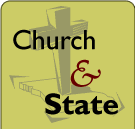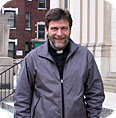 |
|||||||||
|
| home | our mission | contact us | issue archive |

Mar 2001 / church and state :: email this story to a friend

The Sanctuary and the Street
By Father Mike LydonThere are the kind of churches where the congregants show up on Sunday mornings, do the Sunday morning thing, and then disappear until the next week. And then there are chuches like St. Pius V Catholic Church, where parishoners often see each other every day or two at various church functions, community meetings and just around the neighborhood.

St. Pius, like many other churches serving an urban area, has found itself increasingly more involved in civic activism and community involvement, and in the early 1990s, a powerful idea was born around a kitchen table in the church's rectory. What if the efforts of laypeople at several churches with similar concerns were brought together in a formal alliance in an attempt to effect greater change? From that question, Churches Committed to Community Concerns (C4) took shape, and now boasts nearly 20 member congregations.
Father Mike Lydon, who came to St. Pius a few years after the formation of C4 and served a term as its president, shares his thoughts about what role the church can play in shaping the civic landscape.
Q: How did you become involved with C4?
A: "Father Rich Creason, who had been here just before I was called to St. Pius, was with C4 from the very beginning. It was such an integral part of what we do here, so I knew I'd be involved from the outset — it wasn't even a question. We had people in our congregation who were already concerned about so many issues facing them in their neighborhoods and on their blocks that it just seemed natural to find ways to help them deal with those problems. C4 has had an interesting range of things brought to deal with, from what I would consider pretty basic or micro-type stuff like problem properties, problem landlords, beautification and petty crime, all the way up to much larger things we share in common with many parishes across the near South side. For example, in July of 1995, there was a big federal question of whether or not Congress was going to gut the Community Reinvestment Act, which basically makes banks lend money to poor people who have no chance of getting a loan on their credit rating. The CRA is important because you get the poor into housing, and stabilize some neighborhoods. Anyway, we brought together hundreds of people to put pressure on Senator Bond and Dick Gephardt to keep the CRA intact — and it worked. We were able to pull off a unified city front to accomplish something big. Now, C4 finds itself working on middle-size projects, mostly in the area of economic redevelopment. Specifically, four areas of concern now are: the old Sears site where Pyramid is now putting up new houses off Grand; the Southtown site; the South Side National Bank and that whole corner of south city; and the redevelopment of Gravois Plaza."Q: Do you find that laypeople from the church feel in any way intimidated from participating in the political process in such a direct way?
A: "Not at all; there is an organic link between our churches, our neighborhoods and our politics to the point where most people are already engaged in some kind of activism anyway, even if it's as simple as participating in their block unit. Building community, welcoming the alien, reaching out in neighborly love — these are all core gospel values that are quite natural to express in a political way. We have many people who have come to political activity through the churches of C4, and there are lots of good neighborhood folks out there as well as elected officials, who may or may not have anything to do with the church. We all meet in the public arena, on a common turf. C4 has devoted a lot of time and energy to developing a process that enages people in the important dialogue our city needs to thrive."Q: How do you personally strike a balance between your obligation to your primary job, pastoring a church congregation, and your desire to be involved in civic activism?
A: "I don't see the two as split. Striking a balance in terms of the limited time in a day is always very hard, but there is no strict divorce between the sanctuary and the street, between the sacred and the profane. It's as much a part of my job as hearing confessions or visiting people in hospitals to be attending demolition hearings and keeping in touch with my alderman. For the Catholic Church, what the Second Vatican Council did was to really say, 'The modern world is the place where the action and the spirit of God can be found, and you have to engage with the modern world.' For many pastors in the city, that urban edge is very appealing to them and an important part of what they do. Four people I consider saints in the 20th century are Ghandi, Martin Luther King, Jr., Dorothy Day and Thomas Merton, and these are all people who really went out and engaged the world on its terms. Perhaps where the church can play a unique role is in encouraging and insisting upon a high standard for civil civic discourse."Father Michael J. Lydon has been the priest at St. Pius the Fifth Catholic Church on South Grand since June of 1995. He was born in St. Paul, Minnesota, and served in Birmingham, Alabama, just prior to his arrival in St. Louis.
Church and State | Games | Expatriates | Communities | From the Source
It's All Happening | Young Minds | The Ordinary Eye | Elsewhere
Sights and Sounds | Media Shoegaze | A Day's Work | From the Editor© 2001 The Commonspace